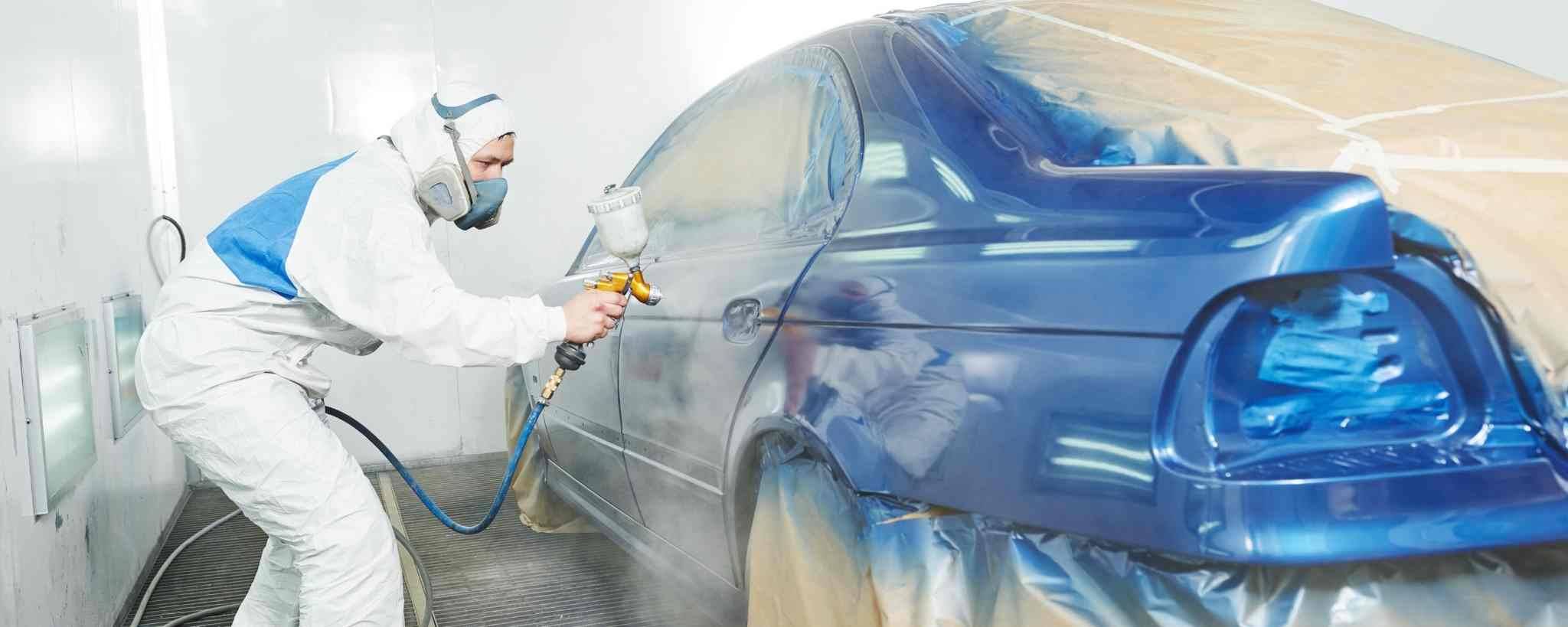How Much Does it Cost to Paint a Car
This blog post aims to explore the various factors that influence the cost of painting a car, offering insights into what you can expect to pay for different levels of paint jobs.

Use AI to summarize this article:
When your car’s paint starts to fade, chip, or show its age, a fresh coat of paint can do wonders. Beyond restoring the appearance of your car, a quality paint job protects your exterior and can even increase its resale value.
But how much does it cost to paint a car? Let’s dive into the details to help you make an informed decision.
Typical Price Ranges for Car Painting
The cost to paint a car varies significantly, depending on factors such as paint quality, vehicle size, and the level of preparation required. Here are the common price ranges:
Basic Paint Jobs: A basic paint job can cost from $500 to $1,000. These are the most economical option that includes minimal prep work and single-stage enamel paint. While basic paint jobs are budget-friendly, they often lack durability and refinement.
Mid-Range Paint Jobs: Ranging from $1,000 to $5,000 mid-range car paint jobs typically include higher-quality paint, thorough preparation, and multiple coats for a smoother finish. This option can provide a more durable finish that better resists the elements.
Premium Paint Jobs: The price of premium car paint jobs can cost from $5,000 to $10,000 or more. Premium services feature extensive prep work, premium multi-coat finishes, and customization options like metallic or pearlescent paints.
For luxury cars or detailed custom designs, the cost of car painting can exceed $20,000. The price varies based on the complexity and quality of the paint job, as well as additional finishes.
Factors Affecting the Cost of Car Painting
Several elements can affect the overall cost of painting a car:
1. Quality of Paint and Finish
High-quality paint ensures a durable, long-lasting finish but comes at a premium. Basic synthetic enamel is cost-effective but less durable, while premium options like ceramic coatings or metallic finishes provide better protection and aesthetics.
2. Vehicle Size and Design
Larger vehicles such as SUVs or trucks require more paint and labor, increasing costs. Similarly, cars with intricate designs or extensive trim need more preparation time, adding to the price.
3. Extent of Repairs
Surface damage such as rust, dents, or peeling paint must be addressed before painting. Repairs can range from $300 to $1,000 for minor imperfections and significantly more for advanced rust removal.
4. Paint Finishes and Protective Coatings
Optional finishes like wax, sealants, or ceramic coatings can extend the life of your paint job.
Ceramic coating, for instance, ranges from $1,000 to $3,000 but offers years of protection from the elements. Paint protection films (PPF) provide even more durability, with costs starting at $1,000 and going beyond $8,000 for full coverage.
When Should You Repaint Your Car?

While repainting might sound like adding extra cost to your car maintenance, it’s all about protecting the exterior of your car. Here are some common scenarios where a new paint job may be required:
- Aging Paint: Faded or peeling paint exposes your car to the elements, increasing the risk of rust and damage.
- Visible Damage: Scratches, dents, and rust require immediate attention to prevent worsening.
- Customization: A new paint job lets you personalize your car and give it a fresh look.
Professional vs. DIY Car Painting
While painting your car yourself can save money, it often leads to less satisfactory results compared to professional services. Here’s a quick comparison:
Professional Car Painting
| Pros | Cons |
|---|---|
| High-quality results | Costs range from $1,000 to over $10,000 depending on quality and customization |
| Often includes a warranty | |
| Longevity and durability |
DIY Car Painting
| Pros | Cons |
|---|---|
| Affordable, with materials costing a few hundred dollars | Requires significant time and effort |
| Offers a sense of accomplishment | Results may lack refinement and durability |
Alternatives to Painting Your Car
If repainting feels too costly or permanent, consider these alternatives:
Vinyl Wrapping: Vinyl wrap is a versatile option that’s less expensive and reversible. Prices range from $2,000 to $5,000.
Touch-Up Kits: Best for small scratches or chips, costing $50 to $200.
Related Article: How much Does It Cost To Wrap a Car?
How to Protect a Freshly Painted Car
A freshly painted car needs proper care to maintain its look and longevity. Here are some tips to protect your new paint job:
Avoid Washing Immediately
Allow the paint to cure for at least two weeks before your first wash. When you do wash it, use a mild, pH-neutral car shampoo and a soft microfiber mitt to avoid scratching the surface.
Use High-Quality Wax or Sealants
After the curing period, apply a premium wax or synthetic sealant to create a protective barrier against UV rays, dirt, and debris.
Avoid Harsh Conditions
Park in shaded areas or garages to protect the paint from sun damage, bird droppings, and acid rain. If outdoor parking is unavoidable, use a high-quality car cover.
Invest in Regular Detailing Services
Schedule routine car detailing service to keep the paint looking fresh. The exterior detailing packages generally include gentle washes, reapplying wax or sealants, and addressing minor scratches promptly.
Frequently Asked Questions About Painting a Car
Is it Worth Repainting a Car?
Investing in a paint job can be worth it if you're restoring a classic car, looking to achieve a specific custom look, or aiming to protect and enhance the car’s resale value. These high-end paint jobs offer superior finish and durability.
Is it Cheaper to Paint or Wrap a Car?
Wrapping a car is generally cheaper than a high-quality paint job. A basic wrap can cost between $2,000 and $5,000, while premium wraps with custom designs might cost more. Paint jobs, on the other hand, range from $500 for basic options to over $10,000 for premium finishes. Wraps are also less permanent, allowing for easy removal or updates, making them a cost-effective and versatile alternative to repainting. However, paint typically offers better durability and a more natural finish, making it ideal for long-term solutions.
How Long Does it Take To Paint a Car?
In general, it might take 40 to 80 hours to complete a full car paint job.
However, the duration of a professional paint job can vary from a few days to a couple of weeks, depending on the complexity of the job, the amount of prep work required, and the specific processes used by the paint shop.

Parham Koukia
Lead Car Detailer / Operations Manager
With nearly 15 years of hands-on detailing experience, Parham has become a trusted authority in the auto care world. His work is regularly spotlighted in leading outlets like CNN, GoBankingRates, and Family Handyman. Parham likes to share his knowledge to offer in-depth tips on equipment selections, seasonal car care, and some secret car cleaning tips used by detailers in the real world!
Read more
